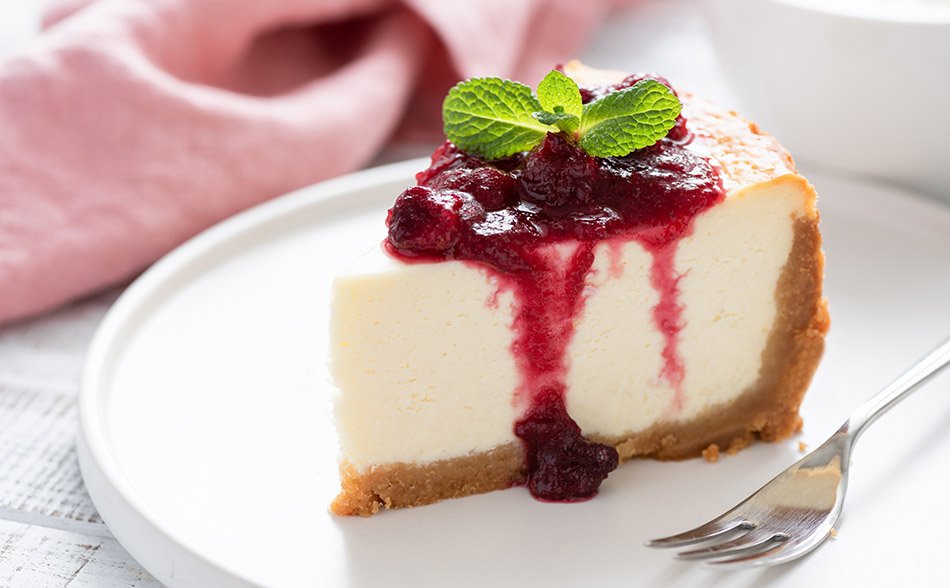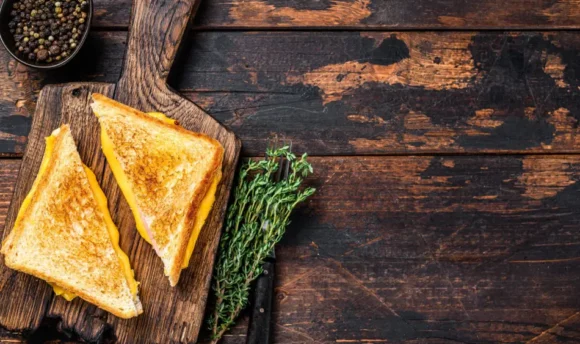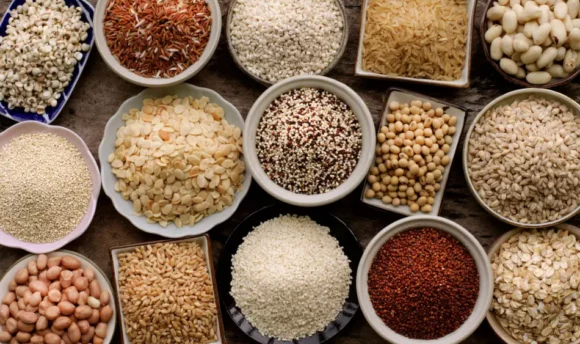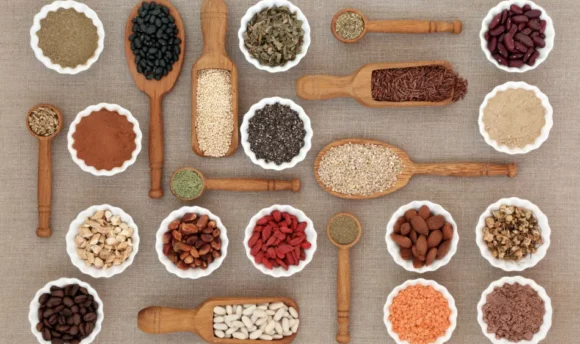Is Cheesecake Healthy? Nutrition Facts and Health Benefits
Everybody loves a delicious dessert, but you must be mindful of how healthy or unhealthy your dessert of choice is. This article reviews cheesecake, a popular sweet treat adored by many, to conclude whether it’s a food to include or limit as part of a balanced diet.

Cheesecake is a sweet dessert with a biscuit bottom crust. It’s topped with a layer of filling made from soft cheese (usually cream cheese, cottage cheese, or ricotta cheese), eggs, and sugar. It’s a mouth-watering treat that sparks your appetite just from reading the description.
When something is so delicious, often, we need to question its effects on our health. While it’s easy to indulge, you should be mindful of your chosen foods. Cheese is a healthy addition to many people’s diets, but what about cheesecake?
Keep reading this article to discover if cheesecake makes for a healthy choice.
Is Cheesecake Healthy?
In a nutshell, no, cheesecake is not healthy to include in your diet. This delicious, sweet dessert is high in calories, saturated fats, and added sugar. However, a slice of cheesecake as part of a well-balanced and nutritious diet in moderation will not significantly affect your health.
Regular cheesecake does have some nutritional value. It contains plenty of calcium, some protein, and smaller amounts of phosphorus, potassium, selenium, and vitamin A. You don’t need to deny yourself cheesecake. It’s all about balance and having your favorite sweets in moderation.
3 Health Benefits of Cheesecake
Cheesecake is not the healthiest option, but it isn’t all bad. When you’re mindful about your intake, you can enjoy eating cheesecake and the advantages it can bring to your body. Suppose a chunky slice of cheesecake is your favorite after-dinner delicacy.
In that case, you can benefit from these 3 things:
#1 Good for your bones
Cheesecake is high in calcium due to dairy ingredients like cottage cheese and eggs. This mineral is responsible for healthy bones and teeth, ensuring strength and structure. Adequate intake is needed for bone health throughout early and adult life.
#2 Contains vitamin A
Cheesecake contains a good amount of vitamin A, also known as retinol. It is a fat-soluble vitamin found in food and has several vital functions. Most importantly, vitamin A is responsible for eye health, vision, growth, development, and maintaining a robust immune system.
#3 Contains antioxidants
Among the nutrients in cheesecakes are powerful antioxidants and carotenoids. Antioxidants promote good health because they protect your cells from damaging free radicals. These molecules contribute to chronic health problems, including cardiovascular disease and cancer.
3 Disadvantages of Cheesecake
Like chocolate cake, sweets, and other desserts, cheesecake has its disadvantages. It’s a high-calorie food that will not benefit your diet if you consume it excessively. Below, we discuss 3 important drawbacks of cheesecake to explain why you shouldn’t have it too often.
#1 It can cause weight gain
You might experience unwanted weight gain if you fill up on cheesecakes regularly. It has a high-calorie content, and when you over-consume calories, your body stores them as fat. It can take a long time to lose belly fat, especially if you do not partake in regular exercise to burn calories.
#2 Bad for your heart
Cheesecake contains saturated fat, with almost 8g hidden in one piece. This type of fat is bad for your heart because it can raise LDL cholesterol levels in your blood, increasing heart disease and stroke risk.
The American Heart Association recommends that only 5–6% of your daily calories come from saturated fat.
#3 It might cause tooth decay
The biggest problem is that most recipes add sugar to sweeten cheesecake. Sugar in food and drinks is the prime culprit of tooth decay. Dietary free sugars (added sugars) are recognized as the greatest risk factor for dental caries.
So, too much cheesecake is likely to harm your teeth.
Nutrition Facts of Cheesecake
To uncover the nutritional status of cheesecake, we must look at the facts. You can then see precisely what is going into your body when you indulge in this luxury food. Most cheesecakes in the store are higher in fat and calories than their homemade counterparts.
Below, you can see the nutrition facts of commercially-prepared cheesecake.
Nutritional value (per 100g)
| Calories/ Nutrient (per 100g) | Amount |
| Calories (kcal) | 321 |
| Net Carbs (g) | 25.1 |
| Fiber (g) | 0.4 |
| Sugar (g) | 21.8 |
| Fats (Total) | 22.5 |
| Protein (g) | 5.5 |
| Cholesterol (mg) | 55 |
Source: https://fdc.nal.usda.gov/fdc-app.html#/food-details/172711/nutrients
High in calories
A 100g serving of cheesecake, which is about the equivalent of just over one slice, has 321 calories. That’s a lot of calories for a single portion. Eating too many foods that are high in calories can lead to weight gain because the excess calories are stored in your body as fat.
Low in proteins
Although traditional cheesecakes are made from high-protein sources, including eggs and cheese, it is surprisingly low in protein. You can add more protein by following a cheesecake recipe with additional ingredients like peanut butter, protein powder, or Greek yogurt.
High in fats
Many of the key ingredients are high in fats, including butter, cream cheese, and sour cream. Fat makes up a balanced diet and is a requisite of diets like keto, where you must eat enough fat to fuel your body.
However, eating too much fat, especially saturated, can cause weight gain and an increased risk of heart disease.
High in carbs and sugars
Cheesecake is not a low-carb food because it has 25.1 net carbohydrates per 100g. Even following a 2-week low-carb diet can help you lose weight by lowering insulin and helping the body burn fat.
Cheesecake contains lots of added sugar to sweeten the savory cream cheese. A high-sugar diet is associated with a heightened risk of chronic diseases, including diabetes, obesity, and cardiovascular disease. It’s vital to limit your sugar intake to prevent health problems.
Healthy/Homemade Cheesecake Recipe
Most cheesecakes are full of calories and extra sugar. You should always check the nutrition and ingredient labels of those you buy in the store, as even the mini cheesecakes contain added sugar. Making a healthier cheesecake at home allows you to cut out those extra calories.
You might like to switch up the main ingredients to create a cheesecake that aligns with your diet. For example, you can make dairy-free and vegan cheesecake products. You can even make chocolate cheesecake more beneficial for your diet by choosing more nutrient-dense foods.
Here is a healthy version of traditional cheesecake:
Vegan Cheesecake Recipe
Ingredients
- 1 8-inch pie crust, store-bought or homemade, using graham crackers
- 16 oz vegan cream cheese
- ⅔ cup sugar (or you can use zero-calorie sweeteners like erythritol or monk fruit to make it sugar-free)
- 2 tbsp cornstarch
- 3 tbsp almond milk
- 1 tbsp lemon juice
- 1 tsp vanilla extract
Directions
- Preheat the oven to 350°F.
- Prepare the pie crust in an 8-inch pan and set it to one side.
- Add the cream cheese and sugar to a large mixing bowl and whisk until smooth and creamy. Add the cornstarch, almond milk, lemon juice, and vanilla extract. Combine well and whisk until smooth.
- Add the cheesecake mixture to the prepared pie crust and bake for 40–45 minutes.
- Remove from the oven and allow it to cool fully. Once completely cool, place the cheesecake in the refrigerator overnight or for a minimum of 4 hours.
Nutritional value (per serving)
| Calories/Nutrient (per serving) | Amount |
| Calories (kcal) | 180 |
| Net Carbs (g) | 14 |
| Fiber (g) | 0 |
| Fats (Total) | 13 |
| Protein (g) | 2 |
A vegan cheesecake product is a great way to make this dessert more diet-friendly. If you’re interested in more healthy dessert recipes and want to live a healthier lifestyle, we recommend checking out the best nutrition apps!
FAQs
Yes, cheesecake is fattening if you eat it too often. Cheesecakes are high-calorie desserts with a lot of fat and added sugar. These components contribute to weight gain if you eat them frequently. Try to have cheesecake on occasion and opt for healthier recipes where possible.
Traditional cheesecakes are not the best choice for people with diabetes. The high carbohydrate and sugar content in cheesecakes and other desserts can trigger blood sugar spikes. Stick to small portions and monitor your carb intake for diabetes management.
Traditional cheesecake is not suitable for weight loss because it contains too many calories and unhealthy ingredients. You should eat fewer calories and less sugar when trying to lose weight. Find a healthy cheesecake recipe that you can enjoy on occasion.
A Word From a Nutritionist
Cheesecake has a rich cream cheese filling. This dairy-based treat is made with different cheese varieties, but cottage cheese, ricotta cheese, and mascarpone are among the most popular. The traditional recipe also contains eggs and sour cream or heavy full-fat cream.
The base is typically made from graham crackers or crushed cookies with melted butter. You can find various cheesecake flavors, such as coconut, pumpkin spice, and vanilla. A chocolate cheesecake product is always a favorite choice among chocolate lovers.
You can lower the fat and sugar content by swapping some simple ingredients. You can make it dairy-free to fit most diets by replacing dairy products. Keep the graham crackers and choose a vegan butter, vegan cream or cottage cheese, and plant-based milk of your choice.
Cheesecake does offer a chance to get fruits into your diet, as it pairs perfectly with fresh berries, such as healthy blueberries and raspberries.
There are always ways and means of making your diet more nutritious. Just remember to remain physically active to keep your body fit and well.
Conclusion
Eating a piece of cheesecake now and then will not harm you, but eating too much too often is detrimental to your health. Cheesecake is a versatile dessert that you can easily tweak to suit your diet.
Use the DoFasting app to find a recipe with the same amount of delicious flavor and half the calories!

















































 Select your language:
Select your language: 








